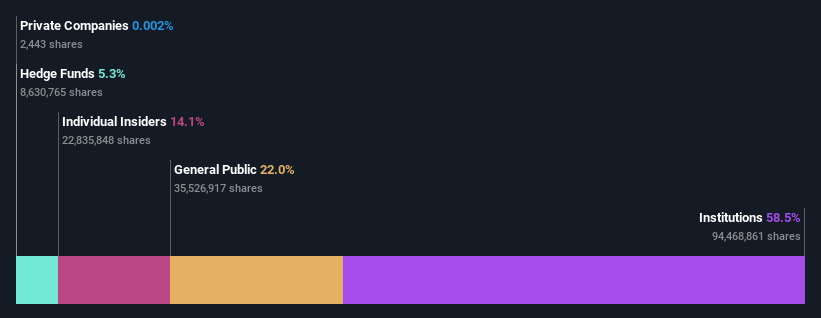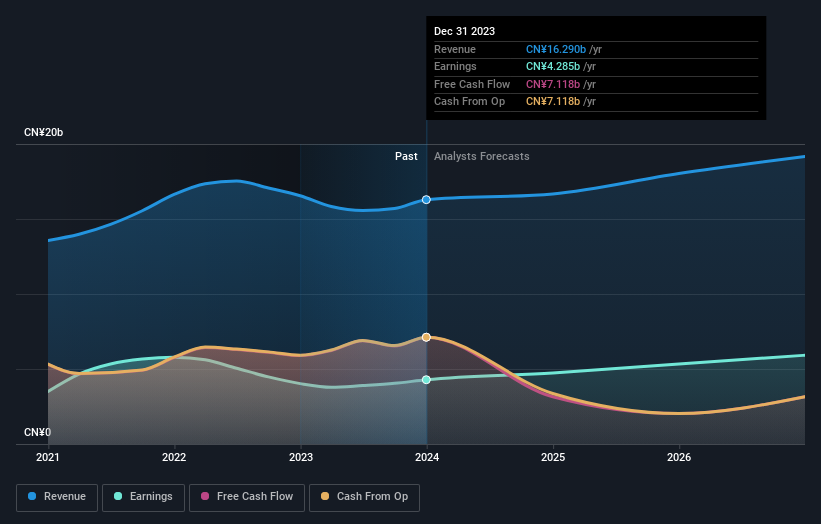With 3.5% one-year returns, institutional owners may ignore Qifu Technology, Inc.'s (NASDAQ:QFIN) 5.4% stock price decline
Key Insights
Significantly high institutional ownership implies Qifu Technology's stock price is sensitive to their trading actions
A total of 12 investors have a majority stake in the company with 51% ownership
Every investor in Qifu Technology, Inc. (NASDAQ:QFIN) should be aware of the most powerful shareholder groups. The group holding the most number of shares in the company, around 59% to be precise, is institutions. In other words, the group stands to gain the most (or lose the most) from their investment into the company.
Institutional investors endured the highest losses after the company's market cap fell by US$171m last week. However, the 3.5% one-year return to shareholders may have helped lessen their pain. We would assume however, that they would be on the lookout for weakness in the future.
Let's take a closer look to see what the different types of shareholders can tell us about Qifu Technology.
Check out our latest analysis for Qifu Technology
What Does The Institutional Ownership Tell Us About Qifu Technology?
Many institutions measure their performance against an index that approximates the local market. So they usually pay more attention to companies that are included in major indices.
We can see that Qifu Technology does have institutional investors; and they hold a good portion of the company's stock. This can indicate that the company has a certain degree of credibility in the investment community. However, it is best to be wary of relying on the supposed validation that comes with institutional investors. They too, get it wrong sometimes. It is not uncommon to see a big share price drop if two large institutional investors try to sell out of a stock at the same time. So it is worth checking the past earnings trajectory of Qifu Technology, (below). Of course, keep in mind that there are other factors to consider, too.
Since institutional investors own more than half the issued stock, the board will likely have to pay attention to their preferences. It would appear that 5.3% of Qifu Technology shares are controlled by hedge funds. That worth noting, since hedge funds are often quite active investors, who may try to influence management. Many want to see value creation (and a higher share price) in the short term or medium term. Our data shows that Hongyi Zhou is the largest shareholder with 14% of shares outstanding. Meanwhile, the second and third largest shareholders, hold 5.3% and 4.6%, of the shares outstanding, respectively.
Looking at the shareholder registry, we can see that 51% of the ownership is controlled by the top 12 shareholders, meaning that no single shareholder has a majority interest in the ownership.
While studying institutional ownership for a company can add value to your research, it is also a good practice to research analyst recommendations to get a deeper understand of a stock's expected performance. There are plenty of analysts covering the stock, so it might be worth seeing what they are forecasting, too.
Insider Ownership Of Qifu Technology
While the precise definition of an insider can be subjective, almost everyone considers board members to be insiders. Management ultimately answers to the board. However, it is not uncommon for managers to be executive board members, especially if they are a founder or the CEO.
Most consider insider ownership a positive because it can indicate the board is well aligned with other shareholders. However, on some occasions too much power is concentrated within this group.
Our most recent data indicates that insiders own a reasonable proportion of Qifu Technology, Inc.. Insiders own US$423m worth of shares in the US$3.0b company. That's quite meaningful. Most would say this shows a good degree of alignment with shareholders, especially in a company of this size. You can click here to see if those insiders have been buying or selling.
General Public Ownership
With a 22% ownership, the general public, mostly comprising of individual investors, have some degree of sway over Qifu Technology. This size of ownership, while considerable, may not be enough to change company policy if the decision is not in sync with other large shareholders.
Next Steps:
I find it very interesting to look at who exactly owns a company. But to truly gain insight, we need to consider other information, too. Consider risks, for instance. Every company has them, and we've spotted 2 warning signs for Qifu Technology you should know about.
Ultimately the future is most important. You can access this free report on analyst forecasts for the company.
NB: Figures in this article are calculated using data from the last twelve months, which refer to the 12-month period ending on the last date of the month the financial statement is dated. This may not be consistent with full year annual report figures.
Have feedback on this article? Concerned about the content? Get in touch with us directly. Alternatively, email editorial-team (at) simplywallst.com.
This article by Simply Wall St is general in nature. We provide commentary based on historical data and analyst forecasts only using an unbiased methodology and our articles are not intended to be financial advice. It does not constitute a recommendation to buy or sell any stock, and does not take account of your objectives, or your financial situation. We aim to bring you long-term focused analysis driven by fundamental data. Note that our analysis may not factor in the latest price-sensitive company announcements or qualitative material. Simply Wall St has no position in any stocks mentioned.

 Yahoo Finance
Yahoo Finance 

